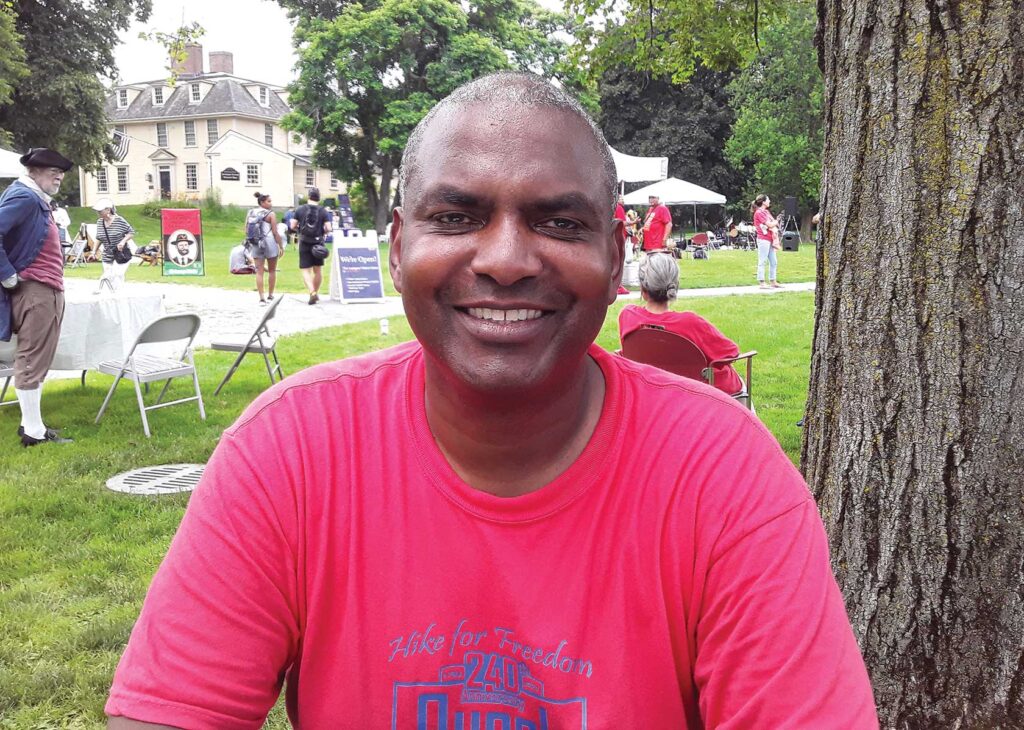Lexington celebrates first official Quock Walker Day
Former slave helped to abolish slavery in Massachusetts

The Massachusetts Legislature passed a law last year declaring July 8 Massachusetts Emancipation Day — a.k.a. Quock Walker Day — and recognizing the significant contributions Quock Walker made to abolish slavery in the state.
The law also acknowledged July 8, 1783, the date the Supreme Judicial Court ruled that Article 1 of the Massachusetts Constitution’s Declaration of Rights rendered slavery unconstitutional.
About 120 people gathered last Saturday on the lawn outside the visitor’s center in Lexington to celebrate Quock Walker Day’s first official commemoration.
Highlights included West African food and dance, a live band, 54th Massachusetts Regiment reenactors, arts and crafts, and children’s games.
“It’s a great moment in Massachusetts history. But it’s important to be reminded of the value of life and liberty, and how far we still need to go,” said state Sen. Cindy F. Friedman, who filed the Senate legislation establishing Quock Walker Day
State Rep. Michelle L. Ciccolo filed the legislation in the House.
The Quock Walker story
Faced with adversity, Walker not only secured his freedom, but also secured the freedom of all Black people in Massachusetts. Formerly enslaved, Walker was the subject of a series of cases filed between 1781 and 1783 that led to his freedom and the abolition of slavery in Massachusetts.
Quock, also called Kwaku or Quork, was nine months old when he and his parents, Mingo and Dinah — believed to be of Ghanaian origin — were sold by Zedekiah Stone to James Caldwell, a resident of Barre, Massachusetts, on May 4, 1754, for a sum of 108 pounds.
Caldwell promised to free Walker when he turned 25. However, the enslaver died before fulfilling his promise. Walker was appraised at 40 pounds and turned over to Caldwell’s wife Isabel as part of her personal estate. She promised to set him free when he turned 21.
In 1770, Isabel married Nathaniel Jennison, of Barre, and died about three years later. Jennison became the owner of Walker and refused to grant him freedom.
Shortly after Walker turned 28, in early April 1781, he emancipated himself.
Jennison found him working on the nearby farm of John and Seth Caldwell and seized him on April 30, 1781, threw him down, brutally struck him several times on his back and arm with the handle of a whip and imprisoned him for two hours.
Believing himself to be a free man, Walker sued Jennison for assault and battery in the Worcester County Court of Common Pleas the following day.
After trial, a jury determined that Walker was in fact a free man and returned a verdict for him awarding 50 pounds in damages. Jennison appealed the judgement to the Supreme Judicial Court, but he failed to appear in court and defaulted. The judgement was affirmed.
But that did not stop Jennison from going after Walker. When Jennison found Walker working for John and Seth Caldwell, he sued them, alleging that without Jennison’s consent, they unlawfully solicited and employed Walker. The Caldwells pleaded not guilty.
Jennison obtained a jury verdict and a judgement of 25 pounds in damages.
But the Caldwells appealed the verdict and judgment to the SJC and were found not guilty.
Jennison was also indicted in September 1781 for assault upon Walker.
When Jennison was tried before the SJC in 1783, Chief Justice William Cushing instructed the jury that the Massachusetts Constitution declares “that all men are born free and equal — and that every subject is entitled to liberty, and to have it guarded by the laws, as well as life and property.”
The Constitution, he added, “is totally repugnant to the idea of being born slaves.”
Cushing further instructed the jury: “This being the case, I think the idea of slavery is inconsistent with our own conduct and Constitution, and there can be no such thing as perpetual servitude of a rational creature, unless his liberty is forfeited by some criminal conduct or given up by personal consent or contract.”
The SJC, on July 8, 1783, found that Walker was a free man — and conclusively established that slavery was abolished in Massachusetts.
The organizers of the celebration said they wanted to honor Walker’s fight for freedom.
“Quock Walker Day is an opportunity to celebrate” his extraordinary life, said Sean Osborne, historian and cofounder of the Association of Black Citizens of Lexington, which sponsored the celebration. Osborne is also credited for raising awareness about Walker to Beacon Hill lawmakers.

After the Lexington celebration on Saturday, the Red Sox recognized Quock Walker Day during pre-game events. Osborne, Friedman, Ciccolo, Boston College professor Zine Magubane, and artist Kamali Thornell appeared on the field with Lt. Governor Kim Driscoll, who displayed the proclamation. PHOTO: Dorothea Osborne
The association aims to increase the political presence and civic engagement of Black residents, create a vibrant Black community in Lexington and increase recognition of the history of Black people in the town.
The group also researches and shares stories of Black residents of Colonial Lexington, including Ann and Philip Burdoo, who bought a farm in Lexington when it was known as Cambridge Farms, Osborne said.
Governor Maura Healey also marked the state’s first observance of the day with an official proclamation.
After the Lexington celebration on Saturday, the Red Sox recognized Quock Walker Day during pre-game events. Osborne, Friedman, Ciccolo, Boston College professor Zine Magubane, and artist Kamali Thornell appeared on the field with Lt. Governor Kim Driscoll, who displayed the proclamation.







